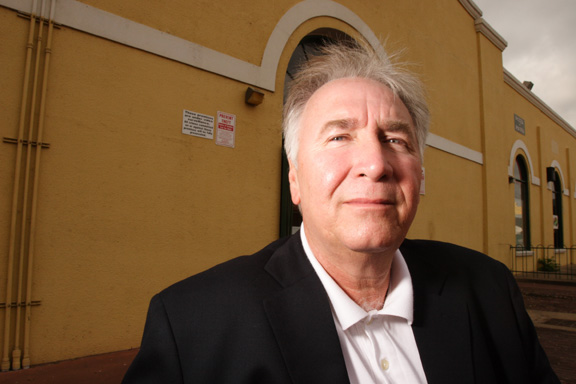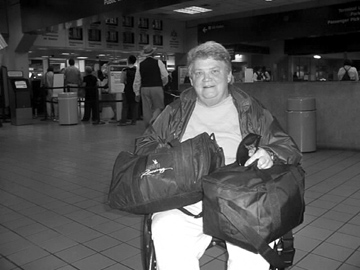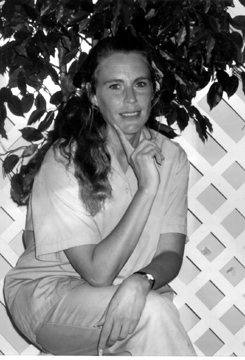It was 2:30 a.m. when a guard woke her up and told her to pack her belongings. By 5 a.m., Karen Lucchesi Lewis was in a Bureau of Prisons bus, shackled and chained, on the way from Carswell Federal Medical Center to a holding facility in Oklahoma City.
 All she had with her were the clothes on her back and a pair of cloth slip-on shoes issued by the prison. The belongings she had hastily thrown together — medicines she needs for lupus and high blood pressure, all of her legal papers, the phone numbers of her attorneys, her only pair of tennis shoes, and the Christmas presents she had crocheted for her parents — were taken from her before she boarded the bus. “I packed what I could, and they still took it all away,” said Lewis, the daughter of former Texas Ranger baseball manager Frank Lucchesi and Kathy Lucchesi. She was speaking on the phone last week from the Oklahoma holding tank. “I was even strip-searched before being put on the bus.”
All she had with her were the clothes on her back and a pair of cloth slip-on shoes issued by the prison. The belongings she had hastily thrown together — medicines she needs for lupus and high blood pressure, all of her legal papers, the phone numbers of her attorneys, her only pair of tennis shoes, and the Christmas presents she had crocheted for her parents — were taken from her before she boarded the bus. “I packed what I could, and they still took it all away,” said Lewis, the daughter of former Texas Ranger baseball manager Frank Lucchesi and Kathy Lucchesi. She was speaking on the phone last week from the Oklahoma holding tank. “I was even strip-searched before being put on the bus.”
Her things will be trashed, she predicted. In fact, she was forced to throw her tennis shoes in a garbage can before she boarded the bus. She has been told only that she will be transferred this week to the Coleman Federal Correctional Center’s low-security camp for women in southeast Florida. She has not been told why. “The only thing I know is that it is not a medical center; there is only a small clinic there with a nurse. I am scared to death for my health, scared for my safety. “This is a constitutional issue now,” she said. “My rights have been violated.” What had Lewis done to deserve the harsh treatment? “I spoke with Fort Worth Weekly,” she said.
And so, the 42-year-old Lewis has joined a growing line of former Carswell prisoners who maintain that they have been punished — sometimes by denial of medical care so severe that their health was permanently impaired — after talking to the Weekly about medical malpractice, rape, possible murder, and a long litany of other abuses that have been documented for almost a decade at the prison camp and hospital just west of Fort Worth. Lewis has been a prisoner at Carswell for almost four years. In 2004 she was convicted of money-laundering in a highly controversial case. U.S. District Judge John McBryde of Fort Worth sentenced her to 78 months in prison, with the stipulation that her time be served at Carswell, the only full-service federal prison hospital in the country for chronically ill women. The reason: Lewis suffers from lupus and high blood pressure, and both conditions can be killers without proper medical care.
On Tuesday, as the Weekly went to press, Lewis was still in Oklahoma. She had been given no medicines, her blood pressure had not been checked since she left Carswell more than a week earlier, and she had not been allowed to see her attorneys. She’s scared for her family as well as herself. A few days after Lewis’ pre-dawn removal from Carswell, her 80-year-old father had a heart attack; he is facing surgery in the next few weeks. Lewis was a key source for the Weekly’s most recent investigative report on Carswell, (“A New Kind of Wage Slave,” Oct. 17), which examined a little-known but highly lucrative side-business run by the BOP: the Federal Prison Industries, Inc., a.k.a. Unicor. The corporation, wholly owned by the bureau, uses its involuntary inmate work force in prisons across the country to provide government agencies with everything from office furniture to body armor as well as offering “services” such as call centers and computer recycling to private companies. The prisoners’ wages range from 23 cents to $1.45 an hour, rates that Unicor’s critics, including Lewis, say amount to slave labor. (At Carswell, under a Unicor contract, inmates work as directory assistance operators for three private communications networks — Excel Telecom, Cricket Communications, and Metro 411 — meaning the companies are getting work done at a tiny fraction of the price they’d pay elsewhere, even if the work were outsourced to other countries.)
 Lewis’ treatment has outraged one of her staunchest supporters, Northside entrepreneur and real estate developer Mike Costanza, who has been working with her family and attorneys to get her conviction thrown out. “First, she was wrongly convicted,” Costanza said. “There was no crime, except one created by the government.” Lewis had been caught up in a money-laundering sting set up by a Drug Enforcement Administration agent, aimed not at Lewis but at her lawyer, the late Anand Alloju, who had access to Lewis’ bank accounts. Alloju admitted forging her name on checks to launder cash provided by the DEA agent posing as a big-time drug dealer from Mexico. Lewis has steadfastly maintained her innocence.
Lewis’ treatment has outraged one of her staunchest supporters, Northside entrepreneur and real estate developer Mike Costanza, who has been working with her family and attorneys to get her conviction thrown out. “First, she was wrongly convicted,” Costanza said. “There was no crime, except one created by the government.” Lewis had been caught up in a money-laundering sting set up by a Drug Enforcement Administration agent, aimed not at Lewis but at her lawyer, the late Anand Alloju, who had access to Lewis’ bank accounts. Alloju admitted forging her name on checks to launder cash provided by the DEA agent posing as a big-time drug dealer from Mexico. Lewis has steadfastly maintained her innocence.
“Now this, taking her out in the middle of the night, taking all of her possessions, scaring her to death, and her family, causing her father to have a heart attack — for what? Because she dared to tell the truth about what is going on out at that prison? What happened to her right to free speech? She still has that right,” said Costanza, who saw two years of combat in Vietnam. “My buddies who died next to me in battle gave me, and her, the right to speak the truth.” Costanza said he is “in total shock that the government could do this. … I’ve got grandkids. I want them to grow up in a free, honest country. As a taxpayer, I’m furious that they [the government] spent all this money to prosecute a woman like Karen for a crime that it manufactured. … And now they’re going to spend even more to send her to Florida. And I can tell you without any hesitation, I am worried about her safety. I don’t know what this crew [the BOP] is capable of doing to her. … She stepped on some pretty big toes in your story.”
Lewis said she’s been told she will be flown from Oklahoma to Coleman in a Con-Air jet along with a half-dozen male prisoners, all of whom, including Lewis, will be in chains and leg shackles. She doesn’t understand the chains because she’s considered a low-risk prisoner who is being sent to a minimum-security camp, and the BOP normally allows such prisoners to be transported by car without handcuffs or shackles. “I’m being treated like a high security risk,” she said, “and we don’t have a clue as to why.” She said her lawyers’ letters and calls to the Dallas regional office of the BOP have not been answered. Nor did Carswell or prison agency officials return calls or e-mails from the Weekly, seeking comment.
“The worst part of all of this is that Karen’s parents won’t be able to see her now,” Costanza said. “It is too far, and they are too old. She has 27 months left on her sentence. Frank could be dead before she gets out.”
 The hardest thing for Lewis to accept, she said, outside of the pain the transfer has caused her family, is the fact that she had told prison officials she intended to speak to the Weekly and been assured there wouldn’t be reprisals. When she told her case manager, a Ms. Mallard (Lewis does not know her first name) what she intended to say, Lewis recalled, “she specifically told me there would be no retaliation, that I had the right to talk to reporters, that my free speech was protected, that I would be in no trouble unless I said something that would endanger another inmate.” Mallard was correct, said local civil rights attorney Frank Colosi, who has represented Carswell inmates. “The Supreme Court has established, in more than one case, that inmates do not lose their constitutional right to free speech or other protections simply because they are imprisoned,” he said. The only exception is if the speech were to provoke something as severe as a riot. Another potential problem for Carswell, he said, is the fact that Lewis is suffering from a life-threatening condition and if the BOP is not sending her to another medical facility where she can get the care she was promised and her condition worsens, the agency could be liable for neglect. “It is hard to prove retaliation,” Colosi said. “However, the timing in this case is suspect,” with the transfer coming so soon after the newspaper article.
The hardest thing for Lewis to accept, she said, outside of the pain the transfer has caused her family, is the fact that she had told prison officials she intended to speak to the Weekly and been assured there wouldn’t be reprisals. When she told her case manager, a Ms. Mallard (Lewis does not know her first name) what she intended to say, Lewis recalled, “she specifically told me there would be no retaliation, that I had the right to talk to reporters, that my free speech was protected, that I would be in no trouble unless I said something that would endanger another inmate.” Mallard was correct, said local civil rights attorney Frank Colosi, who has represented Carswell inmates. “The Supreme Court has established, in more than one case, that inmates do not lose their constitutional right to free speech or other protections simply because they are imprisoned,” he said. The only exception is if the speech were to provoke something as severe as a riot. Another potential problem for Carswell, he said, is the fact that Lewis is suffering from a life-threatening condition and if the BOP is not sending her to another medical facility where she can get the care she was promised and her condition worsens, the agency could be liable for neglect. “It is hard to prove retaliation,” Colosi said. “However, the timing in this case is suspect,” with the transfer coming so soon after the newspaper article.
Lewis is now convinced she is yet another on the list of women suffering because they exercised their right of free speech in complaining to the Weekly about conditions at Carswell. Since 1999, women have detailed abuses at the prison that include medical neglect, wrongful deaths, exposure to dangerous lead levels, and a supposed suicide that former inmates and others believe may have been murder. No one from the BOP or Carswell has responded to questions about Lewis, but in earlier interviews, bureau spokespersons and former warden Joe Bogan denied that prison officials have retaliated against inmates for speaking to the press about the conditions at the former Carswell Air Force base hospital, which reopened as a prison hospital in 1994.
Former inmate Dana Corum, 69, said such denials are “a crock of lies.” In 2000, the Weekly received documents from Corum — a diabetic with high blood pressure and borderline anemia — and additional paperwork from her long-time partner and her former doctor, backing up their allegations of grossly negligent medical care at the facility. Following her conviction for fraud in her home state of Florida, Corum had been sent to Carswell because of her severe medical conditions. She made no secret that she was talking to the Weekly, and just before the story was published, Corum was abruptly transferred from Carswell to the Marianna Correctional Center in Florida. As bad as the care was at Carswell, it was even worse at the Marianna prison, where the only on-site medical person was a physician’s assistant, Corum said. Like Lewis, Corum had her meds taken from her when she was put on the transfer bus and got them back only weeks later.
By that time, according to her former doctor, Corum’s blood sugar levels were so high that her vital organs had been damaged irreparably and her blood pressure soared to stroke level.
 Because her condition worsened at Marianna, Corum was eventually sent back to Carswell, where she finished her six-year sentence under medical care “not much better than Marianna,” she said. She developed neuropathy which, untreated, left her confined to a wheelchair. Since her release, she has had surgery for heart problems caused by her poorly treated diabetes and faces more surgeries. “I walked into that place [Carswell] with my medical problems under control. I left in a wheelchair and was almost given a death sentence for speaking to the Weekly,” she said. Joanie Sampson, a Carswell inmate who had surgery performed on the wrong knee by an outside contract surgeon in 1995 and who was a source for some of the Weekly’s early stories about the hospital’s abject standards of medical care, was scheduled to be released two weeks after her name appeared in a June 8, 2000, article criticizing then-warden Joe Bogan. She had been in prison for 13 years on drug charges.
Because her condition worsened at Marianna, Corum was eventually sent back to Carswell, where she finished her six-year sentence under medical care “not much better than Marianna,” she said. She developed neuropathy which, untreated, left her confined to a wheelchair. Since her release, she has had surgery for heart problems caused by her poorly treated diabetes and faces more surgeries. “I walked into that place [Carswell] with my medical problems under control. I left in a wheelchair and was almost given a death sentence for speaking to the Weekly,” she said. Joanie Sampson, a Carswell inmate who had surgery performed on the wrong knee by an outside contract surgeon in 1995 and who was a source for some of the Weekly’s early stories about the hospital’s abject standards of medical care, was scheduled to be released two weeks after her name appeared in a June 8, 2000, article criticizing then-warden Joe Bogan. She had been in prison for 13 years on drug charges.
A few days before her release, a guard claimed to have found a small bowl in her locker with the remains of some fruit salad in it. She was charged with “fermenting” the fruit juice to turn it into alcohol. Her stay at Carswell was extended for six months as punishment. “I was punished for going public about the problems at the prison,” she said at the time. “It was all a set-up. Why would I take such a stupid chance with just a few days to go until I was released?” Another prisoner, Brenda Woodruff, who spoke to the Weekly in 1999 and was also imprisoned on a drug conviction, had been sent to Carswell a year earlier with a diagnosis from a civilian doctor of invasive cervical cancer requiring “immediate surgery.” It was more than a year before a hysterectomy was finally ordered by a prison staff gynecologist. She was told that the cancer had spread and was scheduled to undergo chemotherapy. Then she was taken off the chemotherapy and told that she’d never had cancer — that the surgery had been performed, according to the gynecologist, as a “precautionary measure.” She presented medical reports and other documentary evidence of medical neglect in her case and others.
Shortly after that story appeared, Woodruff was called into the gynecologist’s office and reamed out for “talking to a reporter.” Later, she was transferred from Carswell to a women’s prison with no on-site medical access. However, she was seen by off-site doctors who confirmed the original diagnosis and said the cancer had by then spread to her pelvic region. Chemotherapy treatments were again started. She was never sent back to Carswell. Neither Woodruff nor Sampson could be reached for comment on this story. In 2001 a number of women and three civilian maintenance workers were exposed to high levels of lead dust after being forced to help dismantle a lead-lined room once used for radiological medicine. They worked in an unventilated room with no protective breathing apparatuses or clothing. The employees were fired after they complained of lead-poisoning symptoms. The inmates were transferred out of Carswell and scattered to other prisons after several contacted the Weekly about the lead exposure and their fears for their health. After the story was published, in 2002, the fired workers were reinstated and given medical disability retirement. By then, however, all were suffering from irreparable lead-poisoning symptoms and could no longer work. The bureau still refuses to release information about the women or their medical conditions.
 Others who spoke to a reporter were sent to the Security Housing Unit, known as “the Shu,” for weeks of isolation on what they say were trumped-up charges. Some lost jobs by which they had earned money for personal needs or telephone calls to families and lawyers. And inmates have not been the only victims of retaliation: A doctor was fired for filing complaints with the bureau about the poor care he claimed inmates were receiving. In spite of such retribution, women continue to contact the Weekly with evidence of medical misconduct. In November, a Carswell inmate gave the newspaper copies of documents showing that she waited more than a year to receive a liver biopsy needed before she could receive treatment for hepatitis C, which she had already been diagnosed with before arriving at Carswell. By then, she wrote, “cirrhosis had set in and [prison bureau officials in Washington] denied … treatment” until she can get other diagnostic tests. She is still waiting for the tests.
Others who spoke to a reporter were sent to the Security Housing Unit, known as “the Shu,” for weeks of isolation on what they say were trumped-up charges. Some lost jobs by which they had earned money for personal needs or telephone calls to families and lawyers. And inmates have not been the only victims of retaliation: A doctor was fired for filing complaints with the bureau about the poor care he claimed inmates were receiving. In spite of such retribution, women continue to contact the Weekly with evidence of medical misconduct. In November, a Carswell inmate gave the newspaper copies of documents showing that she waited more than a year to receive a liver biopsy needed before she could receive treatment for hepatitis C, which she had already been diagnosed with before arriving at Carswell. By then, she wrote, “cirrhosis had set in and [prison bureau officials in Washington] denied … treatment” until she can get other diagnostic tests. She is still waiting for the tests.
And on Aug. 2, according to her mother, Kirstin White, 22, was admitted to Carswell from a prison in Danbury, Conn., with a diagnosis of bone cancer. Michelle London wrote that Carswell officials denied treatment to her daughter until they could do their own tests — which didn’t happen for more than a month. Those tests showed White was in the most advanced stage of non-Hodgkin lymphoma, a cancer that originates in the white blood cells and, in its final stages, spreads to other organs. Aggressive treatment with radiation and chemotherapy is recommended by the National Cancer Institute. Fatality rates at this stage are high. Even after those tests confirmed the cancer, London said, Carswell waited another two weeks to begin chemotherapy, without the added radiation. In the meantime, she said, her daughter was being treated only with pain medicine. “It is so clear to us that the lymphoma had spread to the bone by the time she arrived at Carswell,” London said. “The prison should have started treatments immediately, but [the medical staff] didn’t even open her file until Aug. 17.” In cases like her daughter’s, she said, a delay in treatment of even a few days “can be the difference between life and death.”
London, who lives in Illinois, thinks nothing would have been done had she not enlisted three high-profile members of Congress on her daughter’s behalf. U.S. Sen. — and presidential candidate — Barak Obama, an Illinois Democrat; Alaska Republican Sen. Ted Stevens; and U.S. Rep. Frank Wolf, a Virginia Republican, all contacted the BOP inquiring about the delay in White’s treatment. She is scheduled to be released in February, after serving 18 months for being an accessory to an armed robbery. “I pray every day that I don’t get a call that she’s not coming home,” London wrote. “I think the prison simply meant to house her for the rest of her sentence and had no intention of treating her. It is criminal what the BOP gets away with. I don’t understand why they aren’t accountable to anyone.” Her sentiments were echoed by Costanza. “This is a rogue agency,” he said, “and no one cares.”
You can reach Betty Brink at bettybrink@att.net.











